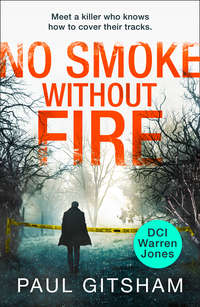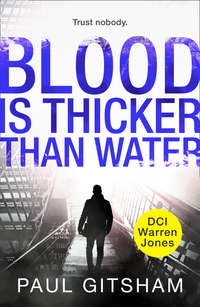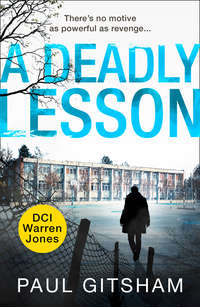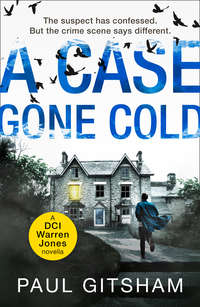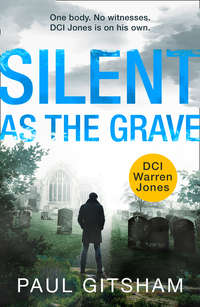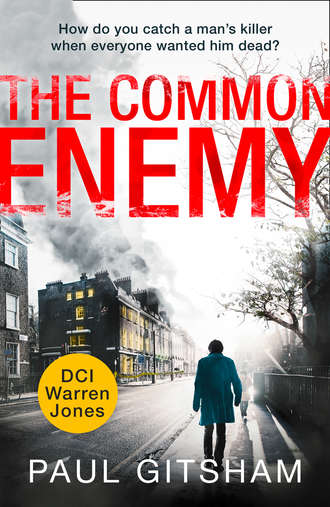
Полная версия
The Common Enemy
‘See this picture of that bin over there? The angle of the droplets suggests they were probably flicked off the tip of the blade when it was withdrawn. The droplets then continue in that direction—’ he pointed down the alleyway in the opposite direction to the shop front, where a series of numbered markers had been placed on the tarmac ‘—with a pattern consistent with dripping—’ he turned a half-circle on the spot, gesturing back towards the main road ‘—and our victim appears to have crawled in that direction, presumably away from his attacker. He didn’t get far; that big patch of blood behind that bin is where we found the body.’
The blood smears were no more than three metres in length and thick. Warren pictured the victim dragging himself away from the person who’d just stabbed him. Another few metres and he’d have been visible to passers-by in the high street. Could he have survived if somebody had found him and called for help? Without realising, he’d asked the question out loud.
‘That’s the sort of question that can only be answered by a pathologist, sir. But if I had to speculate… it’s doubtful. I think it’s a miracle he got as far as he did.’
Warren felt a brief flash of sympathy. Tommy Meegan had been a deeply unpleasant individual, but in those last few moments he was nothing more than a human being facing death – and probably terrified. Did he feel any remorse for the life he’d led? Warren shook off the feeling and turned to point back at the waste container with the blood spatter.
‘Is that where you think the murder weapon is?’
Harrison nodded. ‘We’ve finished sweeping the area around it for trace and we’re about to get in and start looking for it. Unfortunately, somebody from the nail bar dumped a load of rubbish in there shortly before the owners of the chippy discovered the victim behind their own bin. If the weapon was dumped in there it will be buried under half a ton of hair clippings and fake nails.’
Warren sighed.
‘Great, that screws the hair and fibre analysis.’
Visiting the scene probably hadn’t told him anything that he didn’t already know, and the high-resolution photographs that Harrison promised to send him would tell him far more than his eyes ever could, but it gave him a sense of what had taken place.
‘What about clothing?’
‘It was an arterial cut and he would have been pumping blood under high pressure, so I doubt the killer got away without at least some transfer. We’ll be looking for any discarded clothing. Failing that, find me a suspect and give me access to his laundry bin and shoe collection. We’ll find something.’
Chapter 4
Imam Danyal Mehmud’s eyes were bloodshot and the shaking of his hands attested to the adrenaline he was running on. Karen Hardwick and Tony Sutton were seated in the imam’s living room, two streets over from the remains of the community centre. The air in the street still smelled of smoke. The house was a two-bedroom affair with a modest front room whose walls were covered in a mixture of family pictures and framed scripture.
‘Is that the Frozen fan?’ Sutton nodded towards a picture of a smiling infant in a light summer dress. She hadn’t been smiling ten minutes ago when her father had switched the cartoon off and sent her upstairs so they could speak in peace.
‘Yes, that’s Fatima. If I hear “Let it Go” one more time… she’s obsessed.’
‘My niece is about the same age,’ said Hardwick. ‘At least choosing a birthday present was easy this year.’ She paused. ‘Is the little boy in the picture with her the other victim, Abbas?’ Both children were dark-haired, with light brown skin and faces smeared with ice cream.
‘Yes, they’re cousins. My sister’s little boy. They’re almost exactly the same age.’
‘So that means Mrs Fahmida must be your grandmother?’
Mehmud nodded sadly.
‘I’m very sorry, I had no idea.’
The man in front of them was in his late thirties, wearing a white dishdasha over his jeans and trainers. By all accounts he’d been awake for pretty much the entire past twenty-four hours, comforting his congregation and, Sutton now realised, dealing with his own shock and grief. He was clearly running on adrenaline and little else, given that he was still fasting during daylight hours to mark the Muslim holy month of Ramadan.
‘Have you heard anything more from the hospital?’ asked Hardwick.
Mehmud shrugged helplessly. ‘Nani is in intensive care. They aren’t very hopeful. Abbas is poorly but stable. We are praying for his recovery, inshallah.’
Mehmud stood up suddenly as if filled with an energy he didn’t know what to do with.
‘I haven’t told Fatima anything yet. I’ll wait to see what happens in the next twenty-four hours or so. If he… well, she’ll be devastated. My sister and I are very close and Fatima and Abbas are like brother and sister.’
‘I realise that it’s been a trying time but could you take me through what happened that day,’ asked Sutton after a respectful pause.
‘We knew all about the BAP march of course, but I’d tried to persuade people to keep their heads down and not get involved.’ Mehmud shrugged. ‘Not everyone listened. We found out that the BAP were due to arrive about midday. It was easy enough to find their plans on the internet. We’d spoken about it the day before at Friday prayers. We had a higher than usual attendance; there were some brothers and sisters that I didn’t recognise.’
‘People from outside Middlesbury?’ asked Hardwick.
‘I think so. Not many, but I got the feeling that they weren’t there by chance.’
‘You think they’d arrived specifically to join the counter-protest?’
‘Yes. I tried to counsel against it – the last thing we as a community need is to be involved in violence, especially with the planning hearing for the mosque and community centre coming soon.’
‘So what happened on Saturday?’
‘There was an informal gathering here after dawn prayers. Some of the more fiery members of the congregation wanted to take part in the protest marches. A few went off to join in, but most stuck around until midday prayers.’
‘What happened then?’
‘A few more went to the protest and about half went back to lock up their shops and businesses. In the end there were about thirty, mostly women and children, who chose to stay here. I decided to lead by example and stick around.’
‘Why did they stay?’ asked Hardwick.
‘They were scared. There were all sorts of rumours on the internet about Muslims being targeted on the street or having their houses vandalised. All nonsense, of course, but I decided that anybody who wanted to remain was welcome.’
He closed his eyes briefly. ‘They should have been safe here. We locked the doors and there was a police car outside.’ His voice cracked and his bottom lip started to tremble. ‘But they weren’t, were they? We were trapped like rats.’
‘Tell us what happened inside the centre.’
‘It was pretty tense. As the protests got more violent the BBC started to cover it and there was loads of activity on Twitter. We moved the older children upstairs with some toys and the rest of us stayed downstairs to watch the telly.’ His voice hardened, and for the first time an edge of anger crept into his tone. ‘We still thought we were safe. There was a police car up the street, and all of the action was happening in the town centre. Nobody told us the police car had…’ He stopped, unable to continue the sentence.
‘We haven’t been able to get inside the centre yet,’ said Sutton, ‘so you’ll have to help us with the layout. Where were you watching TV?’
‘In the kitchen area, out the back. As you enter through the front door there are shelves for footwear and some sinks for ablutions, straight on is the kitchen, to the left the musallah, the prayer hall.’
‘And where are the stairs?’
‘To the right of the entrance.’
‘And what do you have upstairs?’
‘There are several rooms. The largest is a function room, then there is a storeroom, some bathrooms and another couple of rooms that we use for wedding guests to get changed etc.’
‘Did you know everybody?’ asked Hardwick.
‘Yes, the visitors had all gone off to the march.’
‘Did you see anybody strange hanging around outside?’
‘There were a few brothers outside, but they left eventually.’
‘What do you mean by brothers?’ questioned Sutton.
‘Other Muslims.’
‘How did you know they were Muslims if you didn’t know them?’
Mehmud blinked. ‘Well, they were dressed in thawb with full beards and well, you know, they were Asian.’
Sutton decided to move on.
‘When did you realise the building was on fire?’
‘About two-thirty we heard breaking glass out the front. I told everyone to head into the musallah, since it doesn’t have any windows. However, as we went into the hallway, we saw that the area in front of the door was on fire. I told the women to go through the kitchen and leave through the back door, whilst me and the men ran to get the children.’
The man’s eyes took on a faraway cast.
‘The mats in front of the stairs were starting to catch, so I sent the rest of the men upstairs whilst I tried to put the blaze out with a fire extinguisher. And then my wife came back through to tell me that the back door wouldn’t open.’
He closed his eyes briefly and his voice dropped to a whisper.
‘I didn’t know what to do. We couldn’t stay downstairs and I couldn’t put the fire out. So I sent them all upstairs to join the others. We’d called the fire brigade and I figured they’d be able to rescue us from the top floor more easily.’ His voice broke slightly. ‘The smell was horrible. Some of the shoes had caught fire and there was thick black smoke everywhere. Nani couldn’t get up the stairs unaided though, she’s almost ninety, I had to carry her. By the time we got to the top floor she’d passed out and Abbas was having an asthma attack.’
He looked imploringly at Sutton. ‘Did I do the right thing? Perhaps I should have gone and tried to force the back door open instead. Then she could have got out. But if I’d done that, maybe we’d have ended up trapped downstairs.’
‘I don’t know,’ said Sutton softly, ‘but I do know that your quick thinking made a big difference. You bought everyone valuable minutes for the fire service to arrive.’
It was the best he could offer.
Mehmud smiled his thanks.
‘Before we go any further, do you have any thoughts about who might be responsible?’
For the first time since they’d arrived, the man’s politeness slipped.
‘Bloody obvious, isn’t it? A coach-load of fascists and Islamophobes turn up in the town centre and distract the police, then we get torched. It doesn’t take a rocket scientist.’
‘We’re keeping an open mind at the moment,’ said Sutton, cautiously.
Mehmud took a deep breath. ‘Of course, you’re right. I apologise.’
‘Have you had any other incidents recently?’ Hardwick took over.
Mehmud shrugged helplessly. ‘Some graffiti appeared a couple of nights ago. I didn’t have any paint to cover it up. Before that, nothing really. We get on pretty well with the neighbours. I know that some of my brothers and sisters have been insulted in the street, especially if they are wearing the veil, but Middlesbury is a lot better than some places. The community centre hasn’t been attacked in years, not since nine-eleven or the London bombings.’
Sutton looked at his notes. ‘Can you remember what night the graffiti appeared?’
He thought for a moment. ‘Wednesday night or Thursday morning, I think. We hosted a meal after sundown to celebrate breaking the day’s fast. I locked up about midnight and there was nothing on the wall then.’
The same night the CCTV cameras had been vandalised.
Chapter 5
Visiting the newly bereaved was something that Warren never found easy. Today promised to be even trickier than usual.
To the casual observer, Middlesbury was a quiet, prosperous market town, populated by well-to-do professionals attracted by its semi-rural location, close proximity to Cambridge and Stevenage, and trains that could get you to central London in less than an hour.
All that was true – the house prices certainly favoured the upper-middle classes – but you only had to scratch the surface of anywhere to see its true character. A closer look showed the town’s real inhabitants, its beating heart.
Just under half of Middlesbury’s inhabitants earned less than the median adult wage for the UK. The proportion of residents claiming out-of-work or disability benefits were broadly in line with the regional average and the number of households requiring housing benefit was typical for a town of its size. But as is often the case, such raw statistics obscured the real story.
Three-quarters of Middlesbury’s poorest households lived in a single area, known locally as the Chequers estate – the six tower blocks being named after Prime Ministers from the first half of the twentieth century.
The name was the grandest thing about Churchill Towers, the ten-storey block that Mary Meegan lived at the top of. Had it not been for the two uniformed officers standing conspicuously at the entrance to the building, Warren would have thought twice about leaving his car unattended in the only parking bay not occupied by either a police car or dumped furniture.
Warren peered up at the balconies jutting out of the side of the building. Some had washing on clothes horses, a few had pot plants. Most had people staring at him.
‘Fuck the pigs!’ spray-painted across the doors completed the montage.
‘Ever get the feeling we aren’t welcome here?’ muttered Gary Hastings as he joined Warren.
The call button for the lift remained unlit and it was only the loud clanking and whining from the mechanism that reassured Warren that the stairs wouldn’t be necessary. He almost wished he’d opted for the exercise when the elevator finally arrived. A potent smell of urine, stale beer and cigarette smoke – somebody had tried to burn the no smoking sticker – engulfed the two men as they climbed into the empty lift. Hastings beat him to the number ten button. Turning so that he could face the doors, Warren felt the soles of his shoes sticking to the linoleum flooring.
‘Do you think that’s dog?’ asked Hastings, his face an even sicklier colour under the harsh fluorescent lighting. Warren eyed the sticky brown mess at the edge of the lift. ‘I hope so.’
Apartment ten-fourteen was a dozen steps down the corridor. The uniformed police officer standing outside greeted Warren and Hastings politely, before ringing the doorbell and stepping to one side.
Warren didn’t know what to expect when the door opened into the two-bedroom flat that Mary Meegan, her husband and their two boys had lived in since the late Seventies. Before he’d arrived, Warren had been prepared for everything from Nazi memorabilia and a swastika carpet to snarling Rottweilers and St George’s flag wallpaper. Then upon arrival at the tower block he’d feared he’d be stepping into a dwelling from one of those dreadful ‘how clean is your home’ filler programmes that Channel Four seemed so fond of.
He wasn’t expecting tasteful floral-patterned wallpaper, deep, shag pile carpet and shelves of carefully chosen miniature porcelain figurines. The leather couch was plainly well used, but the polished wooden arms were evidence that the glass drinks coasters weren’t just because Mrs Meegan had visitors. The building around her might be filthy and neglected but she clearly had her standards.
Mary Meegan was a smoker – that much was evident from the thick crevices that lined her face and the staining of her teeth. Nevertheless, the room smelt of air-freshener and furniture polish. A faint breeze carried the smell of cigarette smoke from the open balcony, where Mrs Meegan no doubt partook of her habit and banished similarly addicted visitors.
Through the window, Warren could see the backs of two men seated at a metal table, flanked by large earthenware flower pots containing lovingly maintained bonsai trees. Both had shaven heads. Both of them, he’d want to speak to.
‘Mary, this is Detective Chief Inspector Jones.’ The Family Liaison Officer was a young man with sympathetic eyes.
Mary Meegan turned her head slowly, almost dreamily. The FLO flicked his eyes towards the breakfast counter, where a bottle of whisky sat, half empty.
‘Hello, Mrs Meegan. I’m DCI Jones and this is my colleague Detective Constable Hastings, we’re part of the team that are investigating the death of your son. We’re very sorry for your loss.’
‘Bollocks.’
The speaker had emerged from a doorway that Warren assumed led to the bathroom.
Even without seeing the mugshots that morning, it was clear that this was the brother of the murdered man. Dressed in a white England football shirt and black tracksuit bottoms, he did nothing to hide the tattoos crawling up the side of his neck and covering his sinewy forearms. He stepped forward and Warren caught the whiff of cigarettes and whisky on his breath. He forced himself not to recoil.
‘Jimmy Meegan, I presume?’
The man ignored him.
‘Why are you around here, harassing my mum? You should be out there on the streets arresting the bloke that killed my brother.’
It wasn’t exactly how Warren had planned to open the questioning, but he decided that since Meegan had brought it up, he may as well go with the flow.
‘That’s what we are intending to do. Perhaps you could help us with that. Do you have any suggestions about who may be responsible?’
Meegan stepped even closer.
‘Take your pick, there’s fucking hordes of them.’
Warren had to ask, but he already knew what the answer was going to be.
‘The fucking Pakis. The Muslims, the Sikhs, the Jews, the place is full of them. Half the bastards live in this building. Go out there and start arresting them, you’ll find who did it quick enough. Fingerprint them all and you’ll probably solve most of the unsolved crimes in town.’
Out of the corner of his eye, he could see Hastings trying to keep a blank face. The Family Liaison Officer looked bored; no doubt he’d been hearing this all morning. Unfortunately, Jimmy Meegan was only just getting started.
Warren had dealt with racists a lot over his career. You didn’t spend your early uniform years in such racially diverse cities as Coventry and Birmingham without encountering your fair share of bigots, from all communities. Sometimes it could be dealt with as a public order offence; a verbal warning about use of abusive and racially charged language would usually quieten most of the people he encountered. If that didn’t work, and especially if alcohol was involved, handcuffs and the back of a police van would at least remove them from the scene and ultimately make them the custody sergeant’s problem.
In circumstances such as this, the heavy-handed approach wasn’t really appropriate. Warren recognised that Jimmy Meegan was grieving the death of his big brother. Furthermore, the dilated pupils, reddening of the nostrils, and the obsessive scratching of his left forearm suggested that a presumptive cocaine test on the traces of powder on the man’s top lip would come back positive.
Warren chose his next words carefully, but before he could mouth them he was interrupted by an unexpected source.
‘I’ve told you not to use that language in this house.’
Mary Meegan’s voice was rough, but had the edge of one used to being obeyed. Jimmy Meegan’s eyes flicked towards his mother. For a moment he looked as though he was going to protest, before he shrugged and stalked across the room to one of the armchairs, where he grabbed a grey hoodie.
‘You know I’m right,’ he muttered. ‘Pigs don’t care about us. They don’t care who killed Tommy. We’re an endangered species in our own country.’ He sounded as if he was about to start again, but his mother silenced him with a glare.
‘Boys, we’re going to the pub.’
Ideally, Warren would have liked to interview them there and then, but he could see that Jimmy Meegan was not going to be any help and he decided he’d rather have him and his two cronies out of the way for the time being.
‘Jimmy, I’d like to talk to you later. Do you have a number I can contact you on?’
Warren tried to make his tone as conciliatory as possible.
‘He’ll be here,’ said Mary Meegan.
‘And what about you gentlemen? I’m sure you have plenty of information you’d like to share.’
The two men entering the apartment from the balcony obviously shopped at the same clothing outlet as Jimmy Meegan, and shared his tastes in hair styling and body art. But that was where the similarities ended. The first of the men was hugely obese, his enormous belly straining through the T-shirt. His florid, sweat-spotted face and wheezing made Warren mentally bump him to the top of the interview list, if only so they could speak to him before he dropped dead of a massive coronary. He walked past Warren and Hastings without even looking at them.
His companion was exactly the opposite, the man looked almost emaciated. A gold earring in his right earlobe matched his right incisor, which flashed as he sneered at Warren. ‘I’ll make sure my assistant contacts your office to compare diaries.’
Warren resisted the urge to respond in kind. It didn’t really matter if they refused to give their addresses, he recognised both men from the briefing notes he had read that morning. Harry ‘Bellies’ Brandon and Marcus ‘Goldie’ Davenport were well known and could easily be picked up for questioning back in Romford if necessary.
The police officers waited until the three thugs swaggered out the door, before turning back to Mary Meegan.
‘As I was saying, Mrs Meegan, I’m very sorry for your loss and I promise you that my colleagues and I are doing everything we can to catch your son’s killer.’
The older woman stared at the floor for a few moments without saying anything and Warren debated whether or not he needed to repeat himself. Perhaps a little louder – he’d just noticed the discreet hearing aid.
‘Sit down and take the weight off. Can I get you boys a cup of tea?’
She started to get up. Warren blinked in surprise; he hadn’t expected this. Before he could respond, the Family Liaison Officer spoke up.
‘I’ll get it, Mary.’
As the officer busied himself in the kitchen, Warren mentally changed tack. He’d been anticipating a hostile reception from Mrs Meegan – a woman who it was reported had experienced more than her fair share of run-ins with the police, albeit indirectly through her late husband and wayward sons. An offer of a sit down and a cup of tea was the last thing he’d expected.
‘You know, they aren’t bad boys. Not really.’ The old woman’s voice was gravelly and slightly wistful, but it had lost its dreamy quality. Warren detected no slurring and he suspected that whilst Mary Meegan may have had a glass of whisky to settle her nerves, most of the bottle had been consumed by her visitors.
She indicated towards a picture on the wall. ‘It was him that made them the way they are.’ The photograph of Ray Meegan enjoyed a prominent place above the three-bar electric fire. On the mantelpiece, flanked by yet more porcelain statuettes, a colour wedding photograph showed far younger versions of the man in the portrait and somebody immediately recognisable as Mary Meegan. Whilst Ray Meegan was never what you would call handsome, something that his lank moustache and purple velvet suit hardly helped, Mary Meegan had been a real head-turner back then. Even her thick-rimmed NHS glasses could do little to hide her pretty features; in the same way that the large bouquet of flowers barely concealed her large bump. A shotgun wedding, it would seem.
‘I knew he liked a drink with the boys when he went to the football on a Saturday, but it wasn’t until he was arrested that I realised the truth, silly bastard.’ She shook her head. ‘The first time, it was for knocking a policeman’s helmet off. He thought it was all a bit of a laugh. A night in the cells and that was it.’


